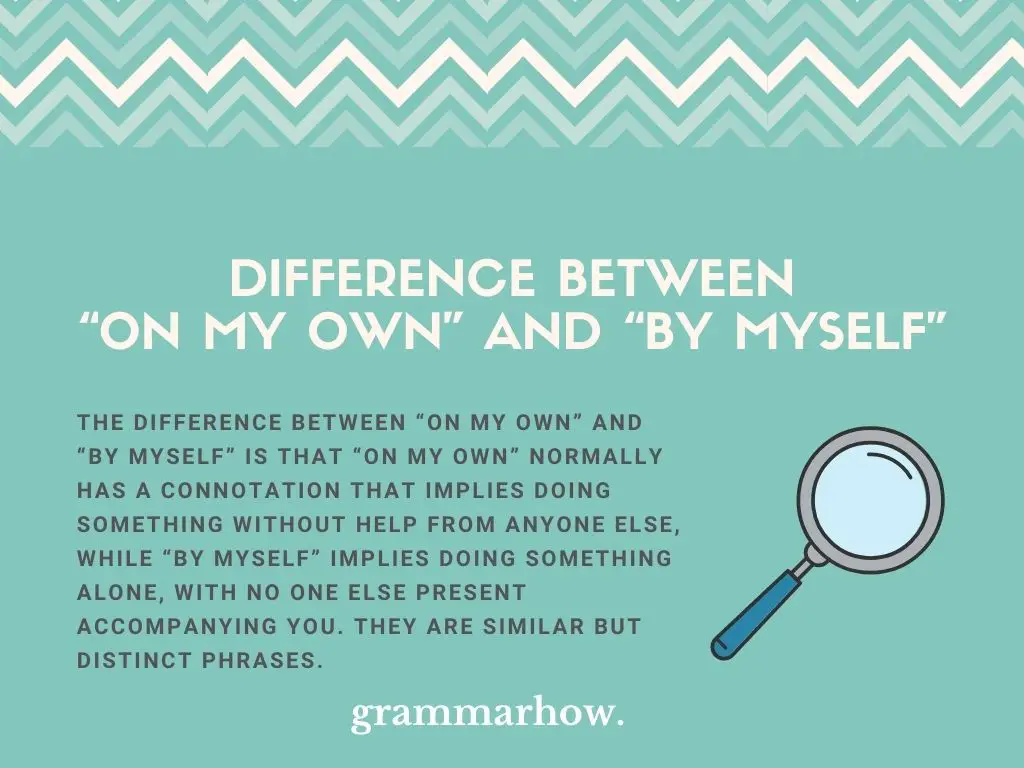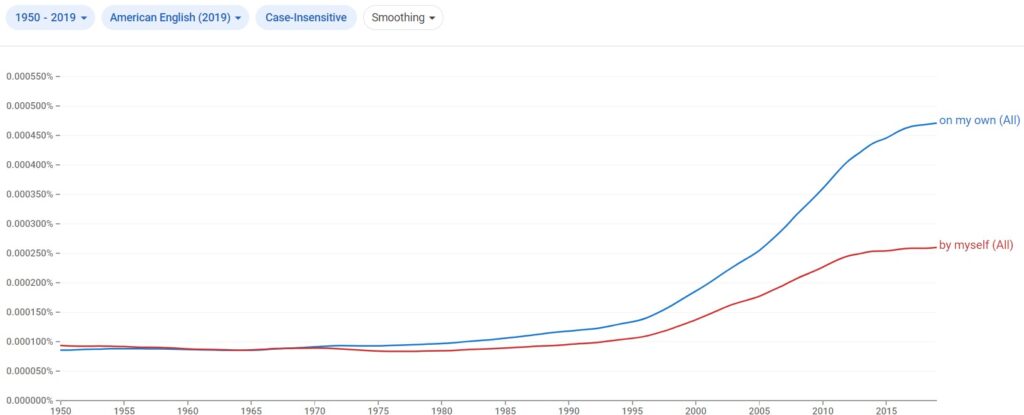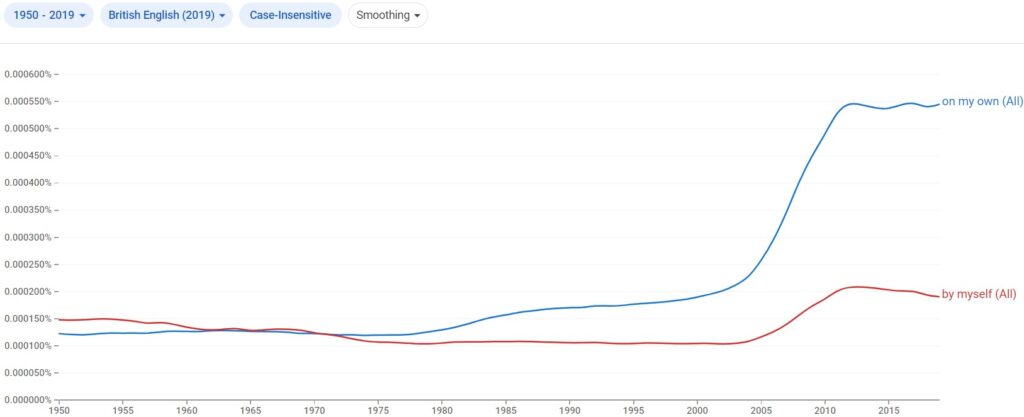The English language has many phrases that are quite similar and mean the same thing in specific contexts, but also have specific nuances that can help distinguish them. “On my own” and “by myself” are two of those similar phrases, and this article will explain the differences between them.
What Is The Difference Between “On My Own” and “By Myself”?
The difference between “on my own” and “by myself” is that “on my own” normally has a connotation that implies doing something without help from anyone else, while “by myself” implies doing something alone, with no one else present accompanying you. They are similar but distinct phrases.

There are many contexts in which you could use either “on my own” or “by myself” interchangeably, when they’re both talking about the connotation of doing something without outside help.
However, they are not interchangeable in all contexts, as there will be cases in which the individual differences between phrases actually are important.
What Does “On My Own” Mean?
“On my own” is a phrase generally used to talk about doing something individually, without outside help from anyone else. When you say you’re doing something “on your own”, it means that you’re performing that action without any outside help.
According to The Cambridge Dictionary, “If you do something on your own, you do it without help from anyone else”. It’s a very simple meaning for a very simple phrase, but it’s a necessary one.
Here are a few example sentences that will teach you how to use “on my own” in a sentence:
- For these specific files, I am on my own, since no one else knows how to work with them.
- I’m afraid that if you’re going to pursue that academic avenue, you’re on your own.
- You have to consider that I’m doing this alone, I’m out on my own here.
- If you’re really on your own, then I will consider helping you with this investigation.
- It’s important to specify that I’m on my own here, there’s no grand organization, just me.
- If you think about it, when you’re on your own is when you’re the most productive.
- I have to make it on my own now that I quit my job and am working as a freelancer for websites.
What Does “By Myself” Mean?
“By myself” is a phrase that is normally used to indicate that a specific activity or action is being performed without someone else present. If you’re doing something by yourself, you’re most definitely physically alone while performing that action. “By myself” can also be used to mean “without outside help”.
According to The Cambridge Dictionary, “by myself” means “alone or without help from anyone else.” While the phrase’s foremost meaning is that of performing an action physically alone, it can also mean without any help.
Here are some examples that will easily teach you how to use “by myself” in a sentence:
- I’m by myself on this project because my boss only trusts me with issues that are this important.
- I was by myself at the time, living in an old and ramshackled apartment over at 3rd street.
- I live by myself and it’s a quite nice experience, because it’s exclusively my living space.
- You’ve gotta understand that I’m all by myself in this big empty house, I’ll obviously get scared.
- She was by herself when the tragedy struck, so we don’t have a precise alibi.
- You’re by yourself in this plane, practically, because most of the seats are free.
- He’s all by himself in this huge movie production, which isn’t a good working environment.
Is It “On My Own” or “By Myself” In The US?
According to data sourced by the Google Ngram Viewer, “on my own” is a significantly more popular phrase than “by myself” in the United States.

The information says that though in the year 1950 “by myself” was actually slightly more popular than “on my own”, they stayed intertwined until about 1971, when “on my own” became significantly more popular.
Ever since, “on my own” has grown at a higher rate than “by myself” in American English, creating a larger gap over the decades since, and solidifying its popularity over “by myself”.
Is It “On My Own” or “By Myself” In The UK?
According to information provided by the Google Ngram Viewer, “on my own” is massively more popular than “by myself” in the United Kingdom.

An interesting fact is that back at the start of the 1950s, “by myself” was more popular, but this changed a few years later, and by 1972 “on my own” was more popular.
“On my own” has kept a large gap in popularity between itself and “by myself” in British English, a gap that is even larger than the one between the two phrases in American English.
It can also be noted that this gap is larger not just because “on my own” is more prevalent, but also because “by myself” is less prevalent in the UK than in the US.
Is It “On My Own” or “By My Own”?
The correct way to state that you’re either physically alone or performing an action without any help is by using “on my own”. “By my own” is a different expression, and is not at all equivalent or a synonym of “on my own”.
“By my own” is always followed by a noun, and it’s not a standalone phrase like “on my own” is. It’s a mistake to consider them equivalent.
Here are a few examples of the difference between “on my own” and “by my own”:
- I am doing this short film on my own.
- I acquired this camera by my own means.
- He did this entire project on his own.
- She got that car by her own means.
Are “Alone” Interchangeable With “On My Own” and “By Myself”?
Depending on the context, yes, “alone” can be interchangeable with “on my own” and “by myself”. However, this is often not the case, and many times using “alone” will give off a connotation of sadness and loneliness that you might not want.
The Cambridge Dictionary defines “alone” merely as “without other people”, which of course means that it will often be used to replace “on my own” and “by myself”.
You simply have to look at the context and measure whether it’s appropriate to replace the phrases with “alone”.
Here are a few examples to showcase the fact that “alone” can be a replacement for these phrases:
- In this class I am by myself.
- In this building I am alone.
- He’s on his own with this project.
- He’s alone with this thesis.
You may also like:
On My Way vs. On The Way – Difference Explained (+Examples)
On My Own Way or In My Own Way – Which is Correct?
